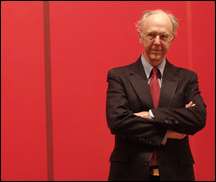Tony Spaeth

Otto Lucien Anton "Tony" Spaeth', Jr. (February 6, 1934 in Saint Louis, Missouri) is a corporate identity planner, consultant, critic and teacher.
Early years
During his childhood, Spaeth's parents took in Anthony Bailey (then himself a child) as a war refugee; Bailey has since told the story of their shared childhood years in the books America, Lost & Found[1] and England, First & Last.[2]
After the Spaeths moved to Manhattan, ‘Tony S’ was schooled at Millbrook and Portsmouth Priory, then majored in architecture at Princeton University. After Navy service (as a corpsman, 2nd Marine Division) Spaeth learned market research and account management at Foote Cone & Belding (now Draftfcb), then joined the Harvard Business School class of 1963.
In 1964, Spaeth was recruited by Lippincott & Margulies (now Lippincott), where “Corporate Identity” was first being thought through as a meaningful professional specialization. From that point on, “identity” became his primary window on marketing and management issues.
Middle Years
Two decades of diverse marketing work followed, including classic product management (at American Home Foods, on Jiffy Pop and Gulden's brands)… the creation of Controlled Brand Marketing Inc., in partnership with industrial designer Robert P. Gersin, to be product managers/designers for supermarket private labels… consultancy on N.W. Ayer & Son’s marketing services team (including a key role in creation of the Absolut Vodka brand)… VP Marketing of the Levolor blinds company… and then marketing direction of several Citicorp business units.
Identity Consulting
Spaeth returned to undiluted identity focus in 1985, when he joined the consulting firm Anspach Grossman Portugal (whose partners he had known from Lippincott & Margulies in the 60s) as director of marketing and a consulting principal. His first act was to change the firm’s descriptive tag from “Marketing Communications and Design” to “Identity Consultants,” thus naming the category in which the firm held a leadership position. Clients he served included American Express and Pfizer. He also restructured and directed the firm’s naming capability. In 1990, when AGP’s partners had sold the firm to WPP Group, Spaeth established an independent consultancy.
Tony Spaeth / Identity
From a base in Rye, New York, since 1990 Spaeth has provided identity planning and creative counsel to scores of clients in diverse categories. He is credited with such corporate brands as Dow Jones, Eastman Chemical, Celera Genomics, Flowserve, Commonfund, FIRST Robotics and Outward Bound USA.
On the Web site Identityworks.com (no longer online), since 1998 Spaeth has reviewed noteworthy new identities of strategic or creative interest, with appropriate credit to chief executives and designers alike. The site also provides a variety of analytic and planning tools for branding and design students worldwide, and contains Identity Forum, where a global panel of leading thinkers and practitioners address identity issues.
Since 1992, Spaeth’s annual rebrandings overview article has appeared in The Conference Board Review magazine, thus providing a record covering nearly two decades (and counting) of significant identity change.
Spaeth also created and, in collaboration with consultant Tom Vanderbauwhede in Antwerp, maintains the Corporate Brand Matrix, building a data base of rebranding case histories for students of identity change. The Matrix documents the leadership intentions in noteworthy corporate rebrandings, matched to the rebranding tools used to achieve them.
In addition to serving the identity community, Spaeth is active in alumni public service initiatives, as advisor to Princeton Project 55 and as a founding director of Partners of ’63 of the Harvard Business School, which seeks systemic improvements in America’s public education systems.